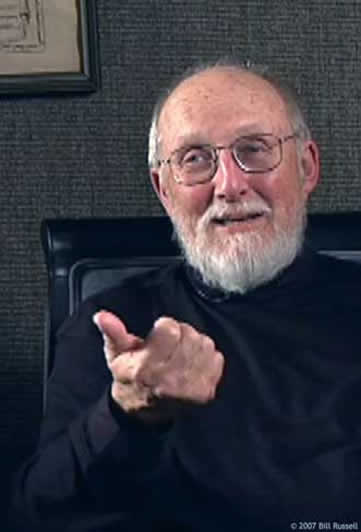 |
|
Frederick Ferré... philosopher. The world’s leading Constructive Post-Modern philosopher. Dr. Ferré is Research Professor Emeritus of Philosophy, The University of Georgia, and Associate Fellow at Dickinson College where he also taught for many years. His extensive body of work includes his crowning trilogy, Being and Value, Knowing and Value, and Living and Value. In them, he addresses much of Western philosophy and articulates his own inspiring invention, “kalogenesis,” the creation of beauty. Professor Ferré’s Philosophy of Technology is a lucid and comprehensive view of humanity’s ongoing relationship with technology, for good and for ill. He and his wife Barbara Meister-Ferré, a linguist, divide their time between the United States and Germany. |
|
 1:22 1:22  |
A gigantic page of history is turning over, leaving the "modern" behind after 350 years, reports philosopher Frederick Ferré. Say goodby to "the idea that everything’s dead and unconscious, that we can predict everything -- Descartes’ reductionism and materialism."
To help us navigate our way through unbelievably huge changes he sees ahead, Dr. Ferré has created a powerful new philosophy based on "kalogenesis" ("making beauty") in the face of death.
"The meaning of life is to be both a maker of beauty and a destroyer of beauty in order to make more beauty. That really is the rhythm of the universe,” says the world’s leading constructive post-modern philosopher.
While Dr. Ferré anticipates an era of “hope and possibilities", he acknowledges, “A lot of people are lost.” And since he believes one of philosophy’s strengths is counter-acting hopelessness, he offers simple rules of thumb for advancing kalogenesis: 1.) Do no harm; 2.) Do good; and 3.) Be fair.
Dr. Ferré uses all of philosophy’s rigorous tools -- logic, evidence, and emotions to give them their “oompth” – yet he always returns to kalogenesis.
"I focus on aesthetics as dominant – ‘feeling’ in the muscular sense, as in ‘once more with feeling!’ We also must be able to realize that ugliness not only happens but sometimes is a friend. It breaks apart things that may not ever be put together again quite the same way, but that allows space for something else to be created. And I believe beauty is always relative to the context.”
Dr. Ferré is certain that context is radically important.
"We are created by community in the same way that we create community. We now have to think in terms of the entire globe as ‘community’. Picture a world less divided, less unequal and certainly not at war. Some of the primary conditions of a genuinely beautiful post-modern future include the redistribution of the goods that make up the possibility of a humane and beautiful life for everyone. We’d need a different type of political leadership, people who would be concerned for the wellbeing of wholes rather than simply for one's own class or type or species.”
Given technology’s current and future roles, it’s comforting that the philosophy of technology is one of Dr. Ferré’s specialties.
"When I talk about the context of technology and the way in which we’ve created that which then shapes us, it’s important to remember -- we’re also purposive agents. If we can remember we created our technology, we can remember that we can change it.
"The first step in changing our technologies is to think deeply about who we -- the creators -- are, as well as what the contexts are that hold us, and what we want to be. Because, after all, it’s the purpose-led life that we’re looking towards.”
Finally, kalogenesis helps us understand ‘goods’ need not require unreplaceable resources.
“There are other kinds of ‘goods’ -- humane goods -- say, discovering one’s talent in dance, or creating wonderful music. These are not energy intensive. There’s no need to go shopping. And you can do it under a tree with your shoes off!”
[This Program was recorded November 21, 2007, in Atlanta, Georgia, US.]






